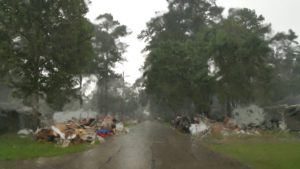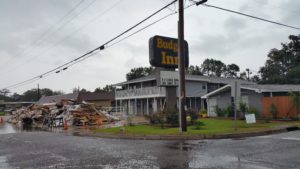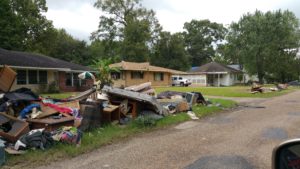Liberation News reporter and Gloria La Riva for President organizer John McDevitt is on the ground in Louisiana in the aftermath of the flood. Conditions are very difficult for him as for all other poor and working people. This article is based on his notes and photos.

The people of Baton Rouge this year confronted racist police murder and the repression faced by anyone who took a stand against it. Then the people in the Florida Parishes of Louisiana faced a flood of historic proportions likely birthed from climate change.
Now in the flood’s aftermath, the people of this region, Black, white, Latino, Asian, as well as Creole, Cajun and other peoples, are confronting the horrors of capitalism that are in many ways more terrible than the natural disaster itself. Like Hurricane Katrina 10 years ago, we see that those who are Black or poor are the last to be rescued or given assistance.
The system of the landlords, insurance companies, banks and corporate bosses has created a new wave of muddied waters in the form of price gouging, rent increases and delayed compensation for insurance claims or other assistance. Red tape and double speak is the language of this ruling class.
These interviews, conversely, tell the story of the 100,000 plus displaced people of the region who are hardly mentioned at all in bourgeois media other than in the context of an upcoming charity concert.
Housing crisis
Areas not impacted by the flood have seen rents tripled. Tenants are receiving letters of rent increases if the flood did not reach their residences. One reported a $150 monthly increase due immediately. Tenants not willing to pay more are relegated to eviction court. This writer experienced firsthand being asked by a landlord for a $600 deposit on an apartment in Mid City. The landlord said she was then going to go to eviction Court the next week to get rid of the current tenant who paid lower rent.

Jeff, a clerk at PetCo who travels to Baton Rouge for work from Denham Springs agrees that rents are skyrocketing throughout the region in the wake of the flood.
He also brings up the issue of the damaged property and debris left in front of properties all over Baton Rouge and surrounding towns and cities. Jeff says Denham Springs is just mountains and mountains of debris.
Answering services are the first contact for any renter seeking an apartment when calling a building. Most of these are out of state and schedule appointments for apartments that do not exist. These leasing agencies pressure renters to pay application fees that range from $25 to $50 in this region of Louisiana without there being any hope of an apartment in the near future be coming available.

Meanwhile, motels have become the temporary housing of many families and also relief workers who have been brought into the area to assist those in need.
Like with apartments, hotels and motels have jacked up prices throughout nearly the entire state of Louisiana. On more than one occasion, a representative of Hotels.com told this reporter it had no rooms available anywhere throughout the state. She suggested going to cities and towns on the border of Texas and Mississippi in areas up to 5 hours away from Baton Rouge or New Orleans in order to pay less than $150 or at night, and even then it was nearly impossible to find a room.
Effects on transportation
It is still unclear how many cars were damaged as floodwaters rose throughout Baton Rouge and surrounding towns. The estimate is roughly a five-digit number with possibly tens of thousands of cars and other vehicles damaged. Like so many Southern towns without adequate public transportation, workers students and others are dependent on cars to get to and from places of work and study and for other life necessities.
Eric Bell, a casino worker who lives off of Plank Road, thought like so many others that the water would not continue to rise. But as it did continue it was too late for him to move his pickup truck and it was totaled from water damage. Now six weeks later he is still waiting for a check from his insurance company.
Although the government is not doing anything to support the people, in Baton Rouge and surrounding areas, the people themselves have taken on a great deal of responsibility for each other, passing along information, helping each other find housing or giving rides, like Eric’s coworkers who come and pick him up and bring him home after his shift at the casino.
Federal Emergency Management Agency not helping the people

“You can smell it in the air. There’s so much clean up that needs to be done,” said Yalanda Gilmore who has been displaced by the flood.
FEMA is coming in and saying that things don’t need to be replaced, they can be repaired.
“There’s nothing I can repair–how can I repair a mattress damaged by sewage? The only thing I could say was the living room. One neighbor got only $500 for personal property. My washer and dryer is considered repairable. The washer and dryer shorted out after being submerged in water. FEMA is not going to help me replace it.”
Yalanda continued: “The neighborhood where rent is normally $300 is now going up to $900. I’m still waiting for storage for my salvageable furniture. FEMA is not replacing clothing or entertainment items like television sets. People are not getting proper rest…people spend the day lining up the lineup for appeals to FEMA at Sherwood Forest everyday.”
To get Red Cross assistance you have to be denied by FEMA and then families are only getting $125 per person.
Generations of teaching materials lost

Liberation interviewed Alex Efferson who told of the impact of the flood on his mother.
“My mom lived, before, paycheck to paycheck. It’s the financial part that hurts the most. My mom was mostly struggling because she’s a teacher and she lost most of her stuff because her school is completely submerged. The flood prevented her from making any income. All the women in my family have been school teachers. Teaching materials handed down from the 50s, 40s, and 60s all destroyed. The school where my mom worked, Glen Oaks, was completely submerged.”
Alex is a manager in a local pizza chain and he has also witnessed the impact of the flooding on coworkers. As the Millville store was destroyed, workers were reassigned to Baton Rouge. “So my staff had to either commute to the other side of town or just deal with temporary unemployment.”

In Baton Rouge people’s lives lie in piles in the heat. Capitalism has no plan for cleaning up and stabilizing people’s lives. Despite these daily hardships there is a spirit of a cooperation and mutual support reminiscent of a system where human needs are primary and no neighbor goes without. That spirit, which is shared by the people of Louisiana as they struggle together to recover, in essence is called socialism.






